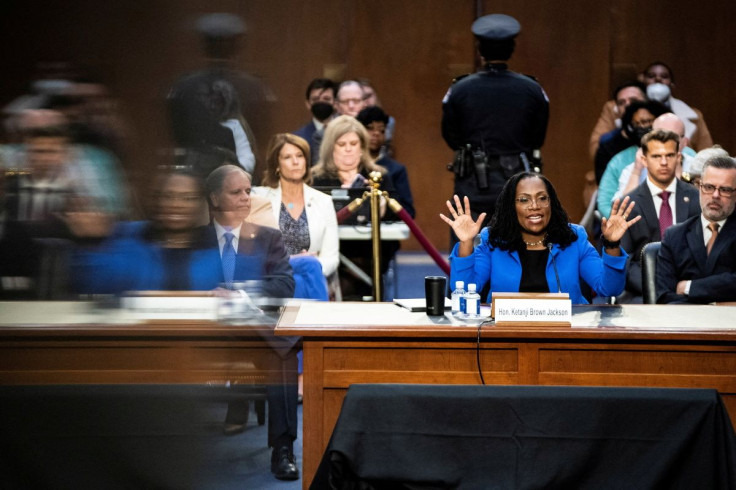U.S. Senate Panel Vote Set To Vote On Biden's Supreme Court Pick Jackson

The Senate Judiciary Committee on Monday was poised to vote on President Joe Biden's U.S. Supreme Court nominee Ketanji Brown Jackson in the next hurdle on her journey toward confirmation, with a potential tie looming on a panel evenly divided between Democrats and Republicans.
Even with the possible 11-11 committee deadlock, Jackson's nomination still would proceed to the full Senate, with Majority Leader Chuck Schumer already saying the chamber was on track to confirm the federal appellate court judge to the lifetime post before its planned Easter recess begins on Friday.
If confirmed, Jackson would become the first Black woman to serve on the top U.S. judiciary body, joining the liberal bloc on a court with a 6-3 conservative majority.
During her confirmation hearing before the panel last month, Biden's fellow Democrats expressed support for Jackson while Republicans signaled opposition with a spree of hostile questions.
"This is the fourth time the committee has voted on Judge Jackson in some capacity - a reflection of her extraordinary legal career," said Democratic Senator Dick Durbin, the committee's chairman, alluding to the fact that she has been confirmed by the Senate to three prior posts.
"It's the first time that the committee has the opportunity to advance the nomination of a Black woman to serve on the U.S. Supreme Court. This is a historic moment for the committee and for America," Durbin added.
Durbin said Jackson has impeccable qualifications and he lamented what he called baseless attacks by Republicans.
With a simple majority needed for confirmation and the Senate divided 50-50 between the parties, Jackson would get the job if Democrats remain united regardless of how the Republicans vote. Biden's fellow Democrats control the Senate because Vice President Kamala Harris can cast a tie-breaking vote.
Senator Chuck Grassley, the committee's top Republican, called Jackson "very personable and engaging" but complained that more documents on her judicial record should have been released and took issue with the nominee on a number of matters.
"Having carefully studied her record, unfortunately, I think she and I have fundamentally different views on the roles of judges and the role that they should play in our system of government. Because of those disagreements I cannot support her nomination," Grassley said.
During her confirmation hearings, Jackson, 51, pledged independence if confirmed and embraced a limited role for jurists. She also reflected on opportunities she has had that her parents, who grew up in era of racial segregation in the South, did not.
Senator Susan Collins last Wednesday became the only Republican to announce support for Jackson's confirmation while also criticizing the current judicial confirmation process as too politicized. Senator Joe Manchin, the Senate's most conservative Democrat, also has announced support for Jackson.
REPUBLICAN CRITICISM
Several Republican senators used the confirmation hearings to accuse her of being lenient on child pornography offenders during her time as a federal trial court judge. Jackson defended her record, saying she did her "duty to hold the defendants accountable." Sentencing experts called the penalties she imposed within the mainstream among federal judges, while American Bar Association witnesses rejected claims that Jackson was "soft on crime."
The committee's tally is expected to be a deadlock after Senator Lindsay Graham, its sole Republican to vote to confirm Jackson last June for a seat on the U.S. Court of Appeals for the District of Columbia Circuit, said he would vote no this time.
A tied committee vote would not block Jackson's nomination, as Democrats would be expected to hold a vote on the Senate floor that would let it proceed. Democrats expect a final Senate confirmation vote on Thursday or Friday.
The process for confirming Supreme Court nominees has become increasingly contentious in recent years. While nominees in decades past often received large Senate majorities, recent votes have been far closer, divided along party lines in a Washington increasingly beset with partisan rancor.
For instance, Republican President Donald Trump's first appointee, Justice Neil Gorsuch, was confirmed in 2017 on a 54-45 vote for a seat previously occupied by the late conservative Justice Antonin Scalia, who was confirmed 98-0 in 1986.
Gorsuch's confirmation followed a partisan brawl after Senate Republicans, then in the majority, refused the prior year to consider Democratic President Barack Obama's nomination of Merrick Garland to replace Scalia after his death.
Trump's second appointee Brett Kavanaugh was confirmed 50-48 in 2018 after a contentious confirmation process in which he denied sexual misconduct allegations, and Trump's third appointee Amy Coney Barrett was confirmed 52-48 in 2020 after being nominated just weeks before a presidential election.
Jackson, if confirmed, would replace retiring liberal Justice Stephen Breyer, who was confirmed 87-9 in 1994.
© Copyright Thomson Reuters 2024. All rights reserved.







